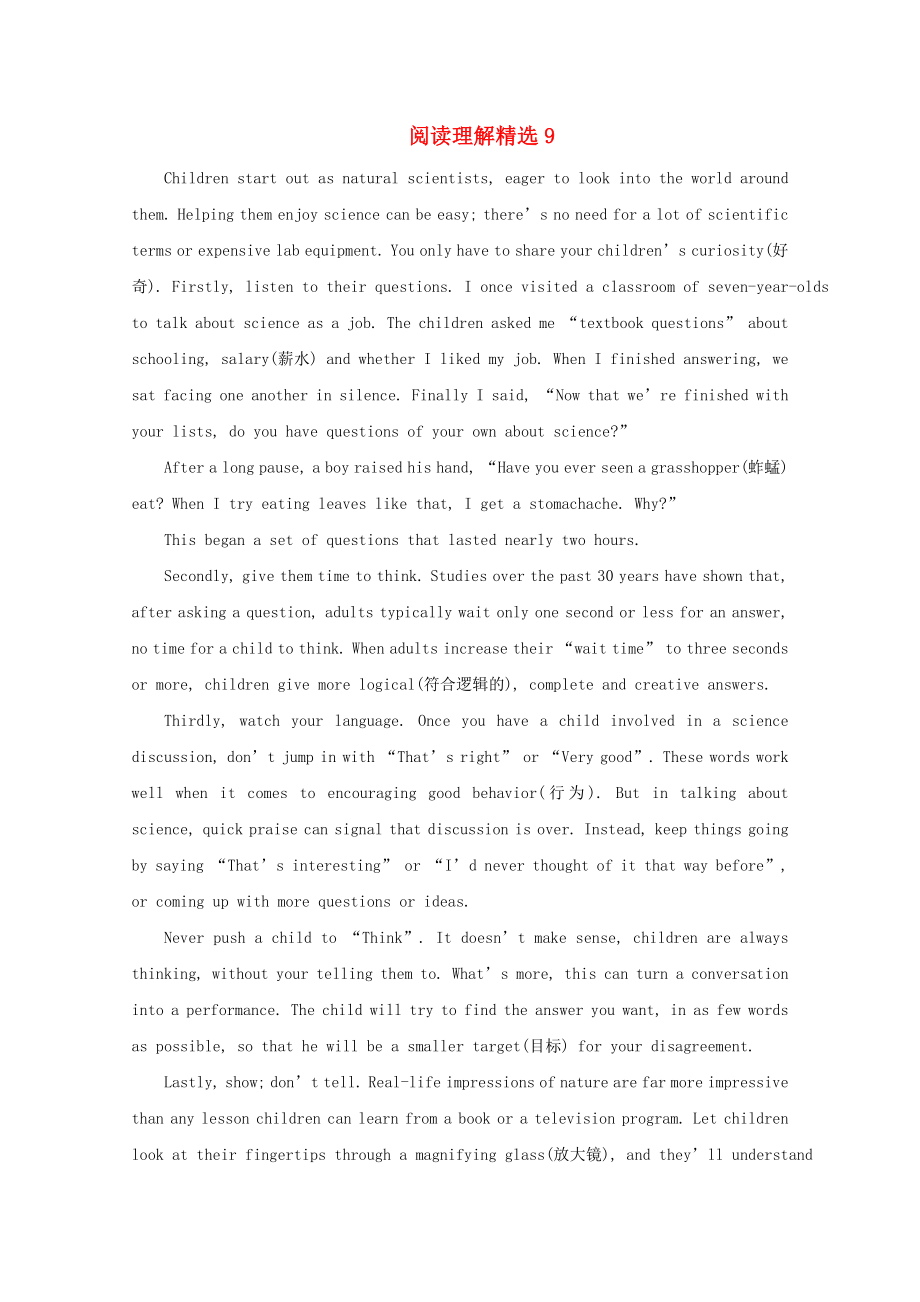《廣東省2013年高考英語(yǔ)二輪復(fù)習(xí) 同步專題 閱讀理解9》由會(huì)員分享�����,可在線閱讀�����,更多相關(guān)《廣東省2013年高考英語(yǔ)二輪復(fù)習(xí) 同步專題 閱讀理解9(3頁(yè)珍藏版)》請(qǐng)?jiān)谘b配圖網(wǎng)上搜索����。
1�����、閱讀理解精選9
Children start out as natural scientists, eager to look into the world around them. Helping them enjoy science can be easy; there’s no need for a lot of scientific terms or expensive lab equipment. You only have to share your children’s curiosity(好奇). Firstly, listen to their questions. I o
2����、nce visited a classroom of seven-year-olds to talk about science as a job. The children asked me “textbook questions” about schooling, salary(薪水) and whether I liked my job. When I finished answering, we sat facing one another in silence. Finally I said, “Now that we’re finished with your lists, do
3���、you have questions of your own about science?”
After a long pause, a boy raised his hand, “Have you ever seen a grasshopper(蚱蜢) eat? When I try eating leaves like that, I get a stomachache. Why?”
This began a set of questions that lasted nearly two hours.
Secondly, give them time to think. Stu
4、dies over the past 30 years have shown that, after asking a question, adults typically wait only one second or less for an answer, no time for a child to think. When adults increase their “wait time” to three seconds or more, children give more logical(符合邏輯的), complete and creative answers.
Thirdly
5�����、, watch your language. Once you have a child involved in a science discussion, don’t jump in with “That’s right” or “Very good”. These words work well when it comes to encouraging good behavior(行為). But in talking about science, quick praise can signal that discussion is over. Instead, keep things g
6�����、oing by saying “That’s interesting” or “I’d never thought of it that way before”, or coming up with more questions or ideas.
Never push a child to “Think”. It doesn’t make sense, children are always thinking, without your telling them to. What’s more, this can turn a conversation into a performance
7�、. The child will try to find the answer you want, in as few words as possible, so that he will be a smaller target(目標(biāo)) for your disagreement.
Lastly, show; don’t tell. Real-life impressions of nature are far more impressive than any lesson children can learn from a book or a television program. Let
8、 children look at their fingertips through a magnifying glass(放大鏡), and they’ll understand why you want them to wash before dinner. Rather than saying that water evaporates(蒸發(fā)), set a pot of water to boil and let them watch the water level drop.
26. According to the passage, children are natural sc
9���、ientists, and to raise their interest, the most important thing for adults to do is _______.
A. to let them see the world around
B. to share the children’s curiosity
C. to explain difficult phrases about science
D. to supply the children with lab equipment
27. In the last sentence of the first
10��、paragraph, the word “l(fā)ists” could best be replaced by ______.
A. any questions B. any problems
C. questions from textbooks D. any number of questions
28. According to the passage, children can answer questions in a more logical, complete and creative way if adults ________.
A. ask them t
11�����、o answer quickly
B. wait for one or two seconds after a question
C. tell them to answer the next day
D. wait at least for three seconds after a question
29. In which of the following paragraph(s) does the author tell us what to say to encourage children in a science discussion?
A. The second an
12�、d third. B. The fourth and fifth.
C. The fifth and sixth. D. The seventh.
30. The author mentions all of the following techniques for adults to share with their children’s curiosity except that adults should ________.
A. tell their children stories instead of reciting (背誦) facts
B. offe
13����、r their children chances to see things for themselves
C. be patient enough when their children answer questions
D. encourage their children to ask questions of their own
【答案與解析】 26—30 BCDCA
【答案與解析】本文說(shuō)明了如何激發(fā)孩子們對(duì)科學(xué)的興趣����,從而引導(dǎo)孩子們學(xué)習(xí)科學(xué)�����。
26. B����。細(xì)節(jié)題。根據(jù)文章第1段第3句中的…share your children’s curiosity可推知此題的
14���、答案為B。
27. C��。推斷題����。根據(jù)文章第1段第6句The children asked me “textbook questions”可推知此題的答案為C。
28. D����。推斷題。根據(jù)文章第4段最后一句When adults increase their “wait time” to three seconds or more, children give more logical, complete and creative answers 可推知此題的答案�����。
29. C。歸納題��。根據(jù)問(wèn)題的內(nèi)容可在文章的第五�、六段找到答案。
30. A���。推斷題���。根據(jù)文章內(nèi)容:從第4段排除C;從文章前3段的內(nèi)容排除D��;從第7段排除B��。從而可推知答案為A����。
 廣東省2013年高考英語(yǔ)二輪復(fù)習(xí) 同步專題 閱讀理解9
廣東省2013年高考英語(yǔ)二輪復(fù)習(xí) 同步專題 閱讀理解9

